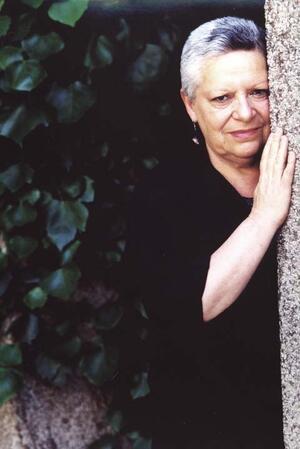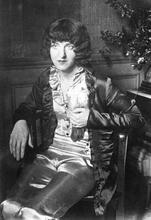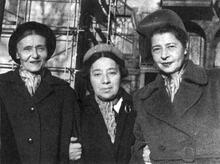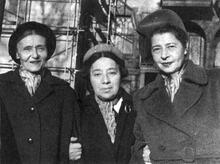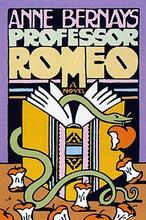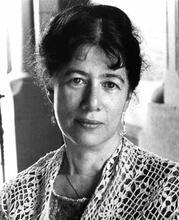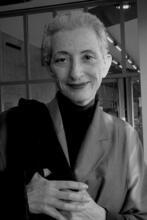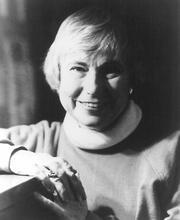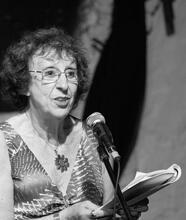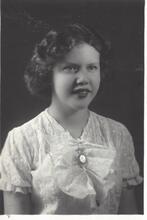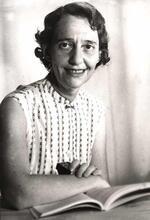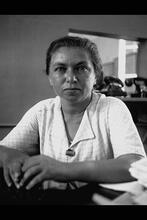Luisa Futoransky
Luisa Futoransky has led a life characterized by travel and the arts. Born on January 5, 1939, in Buenos Aires, Argentina, to Alberto Futoransky and Sonia Saskin de Milstein, Futoransky has spent more than half of her life abroad. Since initially leaving Argentina in 1970 to participate in the Iowa Writers’ Program, she has lived in Italy, Spain, Japan, China, and France, where she has resided since 1981. Although she has occupied a variety of arts and media-related posts, she defines herself first and foremost as a poet. She has published over two dozen books (poetry and narrative fiction), many of which have been translated into English, French, Hebrew, Portuguese, Japanese, German, and other languages. She received a Guggenheim Fellowship in 1991, the Chevalier des Arts et Lettres in 1990, and the Centre National des Lettres Fellowship in 1993 and 2010.
Poet, novelist, music scholar, and journalist Luisa Futoransky has led a life characterized by travel and the arts. Born on January 5, 1939, in Buenos Aires, Argentina, to Alberto Futoransky (1914-2014) and Sonia Saskin de Milstein (1918-2017), both of whom lived in Israel after 1975, Futoransky has spent more than half of her life abroad. Since initially leaving Argentina in 1970 to participate in the Iowa Writers’ Program, she has lived in Italy, Spain, Japan, China, and France, where she has resided since 1981. Although she has occupied a variety of arts and media-related posts, she defines herself first and foremost as a poet.
Early career
Futoransky began her colorful and diverse career as a music student at the Conservatorio Municipal, where she studied under Cátulo Castillo (1906–1975) between 1953 and 1961. During the late 1960s, while pursuing a law degree at the University of Buenos Aires (a career she never practiced), she began to study English poetry with Argentina’s foremost writer, Jorge Luis Borges (1899–1986). Her first three collections of poetry—Trago Fuerte (Strong Drink, 1963), El corazón de los lugares (The Heart of Places, 1964), and Babel Babel (1968)—were published during this period. Futoransky continued her literary studies at the University of Rome and the Accademia Chighiana, Siena. Between 1976 and 1981 she traveled throughout the Far East, where she taught opera at the National Academy of Music in Japan, and worked at Radio Peking in China. In 1981, she settled in Paris, where she has worked at Radio France, the French Ministry of Culture, the Pompidou Center, and France Presse. Perhaps more importantly, France is where she has written the majority of her published works, and where she has expanded her repertoire to include prose and essays in addition to poetry.
Exile and Language
Luisa Futoransky’s writings deal principally with themes of exile and language. One critic, Marcy E. Schwartz, suggests that all her fiction focuses on displacement. When Jewish motifs enter her work, it is often to articulate broader preoccupations with displacement and identity. Laura Kaplansky, the protagonist of Son cuentos chinos (They’re Chinese Tales [colloquial expression for an apocryphal story]) and De Pe a Pa (From A to Z), is a semi-autobiographical character whose Jewishness appears as one of many components of her fragmented identity. Yet, Jewishness also functions as that which questions the very notion of a fixed identity. The idea of the Jew as nomad, in Futoransky’s work, challenges the idea of nationality, a theme that she treats more broadly in other texts. In the poem “Probable olvido de Itaca” (Probable Forgetting of Ithaca), for example, the intrinsic relationship between self and nation is questioned in such lines as “tu sitio, ya lo sabes: partió cuando llegaste” (your place, you know: it left when you arrived). Futoransky also establishes a link between writing and the strong Jewish tradition of textual engagement. Babel Babel’s biblical reference alludes to the fragmentary nature of language.
Gender and the Body
Gender comes into play as yet another marginalizing force, bearing exclusionary potential. The narrator of her novel Son cuentos chinos wonders what can be more disgraceful than being “female, forty-something, alone, not very thin, Jewish, South American, and fickle.” Here, being a woman pertains to a long list of characteristics devalued by society. Thus, according to Laura Beard, Futoransky’s narrative voice is markedly female, as well as feminist. The body is also explored in several works, such as De pe a pa, in which the protagonist’s undiagnosable illness reflects her status as an outsider in France; Pelos (Hair), a philosophical essay on hair; and Dentadura (Teeth), a painfully humorous poem detailing torturous experiences at the dentist. Her works are gracefully composed in a sophisticated yet often colloquial style, and can be characterized by a sharp wit and ironic play.
Worldwide Reception
The translation of Futoransky’s writing into English, French, Hebrew, Portuguese, Japanese, and German—among other languages—as well as her numerous awards and honors reveal the wide reception of her work. She received a Guggenheim Fellowship in 1991, the Chevalier des Arts et Lettres in 1990, and the Centre National des Lettres Fellowship in 1993 and 2010, and she was the Regent’s Lecturer at the University of California, Berkeley in 1997. Her writing has been included in a myriad of international journals, including Trilce, Hispamérica, World Fiction, El Universal, and Taifa, as well as anthologies such as The House of Memory: Stories by Jewish Women Writers of Latin America and Miriam’s Daughters: Jewish Latin American Women Poets. Futoransky’s texts accompany her in her global travels, where they continually influence and are influenced by new audiences and landscapes.
Selected Works by Luisa Futoransky
Trago Fuerte. Potosí: Edit. de la Casa de Moneda,1963.
El corazón de los lugares. Buenos Aires: Perrot, 1964.
Babel Babel. Buenos Aires: La Loca Poesía, 1968.
Lo regado por lo seco. Buenos Aires: Ediciones Noé, 1972.
En nombre de los vientos. Zaragoza: Litho Arte, 1976.
Partir, digo. Valencia: Promoteo, 1982.
Son cuentos chinos. Madrid: Edic. Albatros, 1983.
El diván de la puerta dorada. Madrid: Ediciones Torremozas, 1984.
De Pe a Pa. Barcelona: Anagrama, 1986.
La sanguina. Barcelona: Taifa, 1987.
Pelos. Madrid: Temas de Hoy, l990.
Urracas. Buenos Aires: Planeta, 1992.
La parca, enfrente. Buenos Aires: Libros de Tierra Firme, 1995.
Lunas de miel. Barcelona: Editorial Juventud, 1996.
Cortezas y fulgores. Albacete: Barcarola, 1997.
De dónde son las palabras. Barcelona: Plaza & Janés, 1998.
París, desvelos y quebrantos. New York: Pen Press, 2000.
Estuarios. Buenos Aires: Ediciones del Mate, 2001.
Antología poética. Buenos Aires: Fondo Nacional de Las Artes, 2002.
Prender de gajo. Calambur, 2006.
Inclinaciones. Buenos Aires: Leviatán, 2006.
Seqüana barrosa. Barcelona: EH Editores, 2007.
El Formosa. Buenos Aires: Leviatán, 2009.
Ortigas. Buenos Aires: Leviatán, 2011.
Pintura rupestre. Buenos Aires: Leviatán, 2014.
Marchar de día. Buenos Aires: Leviatán, 2017.
El poema, dos lugares. Oveido: Ars Poetica, 2018.
Los años argentines. Buenos Aires: Editorial Leviatán, 2019.
Beard, Laura J. “A is for Alphabet, K is for Kabbalah: Luisa Futoransky’s Babelic Metatext” Intertext 1:1 (Spring 1997): 25–39.
García Pinto, Magdalena. “Las movadas del exilio: La poesía de Luisa Futoransky.” Confluencia: Revista Hispánica de Cultura y Literatura 14:2 (1999 Spring): 3–11.
Gimbernat González, Ester, ed. Luisa Futoransky y su palabra itinerante. Montevideo, Uruguay: Hermes Criollo, 2005.
Mercado, Sarli E. Cartografías del destierro: En torno a la poesía de Juan Gelman y Luisa Futoransky. Buenos Aires: Corregidor, 2008.
Schwartz, Marcy E. Writing Paris: Urban Topographies of Desire in Contemporary Latin American Fiction. Albany: State University of New York Press, 1999.

